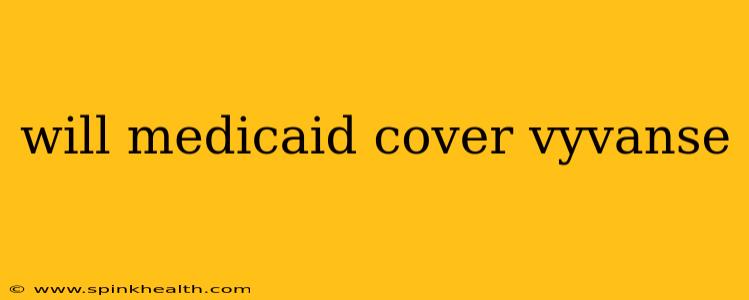Will Medicaid Cover Vyvanse? Navigating the Maze of Prescription Drug Coverage
The question, "Will Medicaid cover Vyvanse?" is a common one, echoing the anxieties of many families facing the high cost of ADHD medication. The answer, unfortunately, isn't a simple yes or no. It's a journey through a complex system that varies dramatically depending on your state, your specific Medicaid plan, and even the pharmacy you choose. Let's unravel this puzzle together.
Imagine Sarah, a single mother working tirelessly to provide for her son, Michael, who recently received a diagnosis of ADHD. Vyvanse, prescribed by his doctor, offers the promise of improved focus and behavior, but the price tag is daunting. Sarah’s hope rests on her Medicaid coverage. Will it cover the cost of this crucial medication?
This is where the story gets complicated. Medicaid, a joint federal and state program, provides healthcare coverage to millions of low-income Americans. However, each state administers its own Medicaid program, leading to considerable variation in drug coverage. Some states have expansive formularies, meaning they cover a wider range of medications, while others are more restrictive.
What Factors Influence Medicaid Coverage of Vyvanse?
Several factors determine whether your state's Medicaid program will cover Vyvanse:
-
State-Specific Formularies: Each state maintains its own list of covered medications, known as a formulary. Vyvanse's inclusion on this list is crucial. You'll need to check your specific state's Medicaid formulary to see if it's covered. This information is usually available online through your state's Medicaid website.
-
Prior Authorization: Even if Vyvanse is on your state's formulary, you might need prior authorization from your Medicaid plan. This means your doctor needs to provide additional documentation justifying the need for Vyvanse before the medication will be approved. This process can be time-consuming, so starting early is essential.
-
Generic Alternatives: Medicaid often prefers to cover generic medications over brand-name drugs like Vyvanse. If a generic equivalent exists and is deemed medically appropriate, they may only cover the generic option.
-
Pharmacy Network: Your Medicaid plan might only cover Vyvanse if dispensed through pharmacies within its network. Using an out-of-network pharmacy could lead to significantly higher out-of-pocket costs.
How Can I Find Out if My Medicaid Plan Covers Vyvanse?
The most reliable way to determine if your Medicaid plan covers Vyvanse is to contact your state's Medicaid agency directly. Their website usually provides contact information and resources to help you navigate the coverage process. Additionally, you can contact your pharmacy or your doctor's office; they may be able to offer guidance on your specific circumstances.
What if Medicaid Doesn't Cover Vyvanse?
If your Medicaid plan doesn't cover Vyvanse, don't despair. There are options to explore:
-
Appeal the Decision: If your claim for Vyvanse is denied, you have the right to appeal the decision. The appeal process varies by state, so be sure to check your state's Medicaid website for instructions.
-
Explore Patient Assistance Programs: Several pharmaceutical companies, including the manufacturer of Vyvanse, offer patient assistance programs that can help reduce the cost of medication.
-
Investigate Other Affordable Options: Discuss alternative ADHD medications with your doctor that might be covered by your Medicaid plan.
Navigating the world of Medicaid drug coverage can feel overwhelming. However, by proactively contacting your state's Medicaid agency, understanding the factors influencing coverage, and exploring alternative options, you can increase your chances of accessing the medication your child needs. Remember, persistence and communication are key to securing the necessary support.

